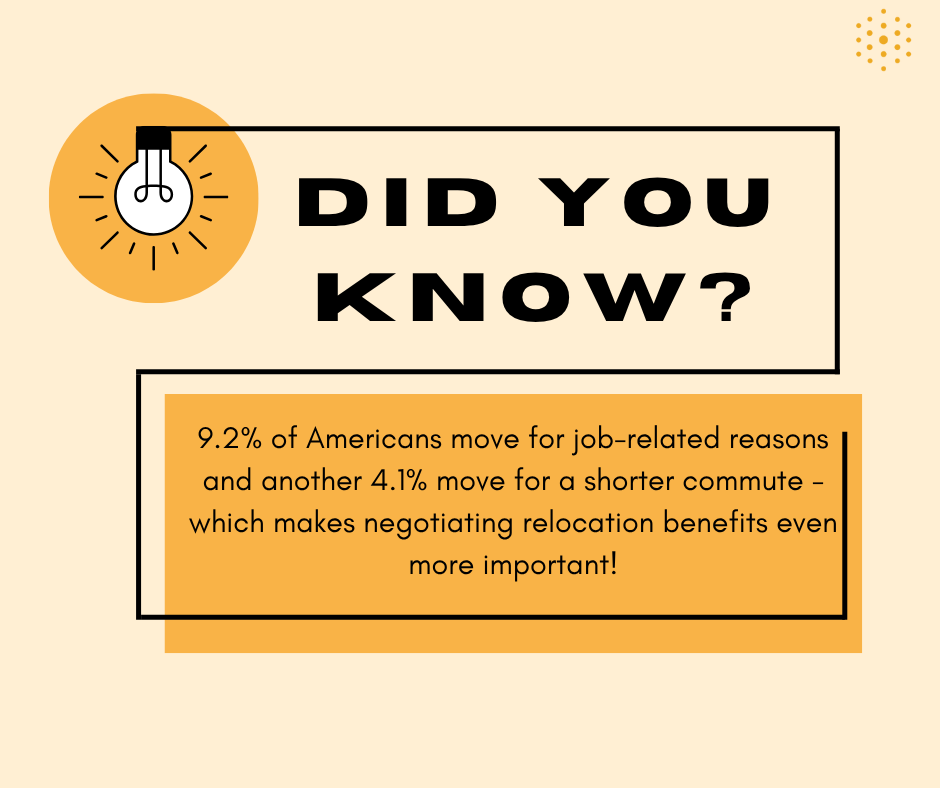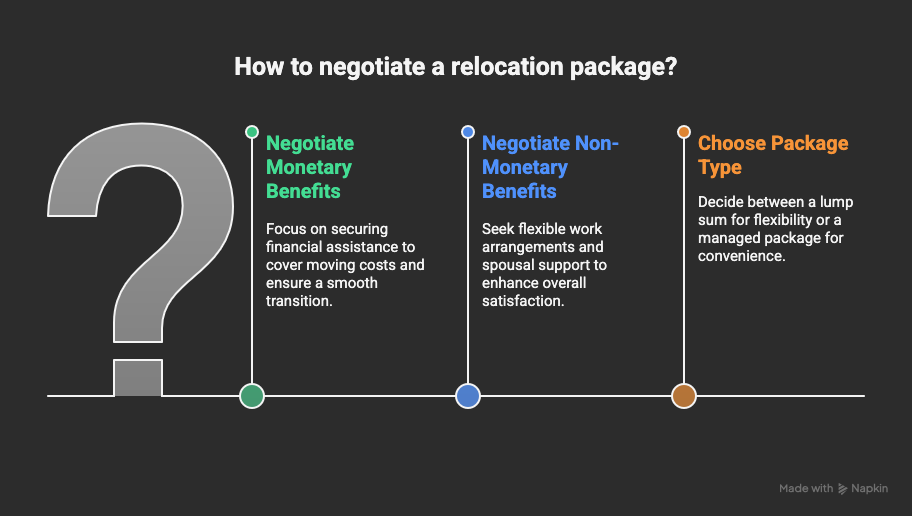How can professionals negotiate a relocation package that truly meets their needs?
Research costs, understand what’s typically covered, and justify your requests with data. Ask about hidden expenses, explore non-monetary perks, and approach the negotiation as a partnership for a smooth, supported move.
Starting a new job in a new city can be both exciting and overwhelming.
According to Allied Van Lines’ Job Relocation Survey, over 64% of professionals receive some form of company-paid relocation assistance when moving for work - proving that relocation benefits are a standard, not a perk.
Still, what’s offered often doesn’t cover everything.
That’s why negotiating a relocation package that truly meets your needs is essential.
This guide will help you approach the process strategically - covering what to ask for, how to justify your requests, and how to secure the right support for a smooth transition into your new role.
What's Typically Included in a Relocation Package?
A typical relocation package covers the basic costs of your move, including transportation of household goods and travel expenses for you and your family.
However, more comprehensive packages can include temporary housing, home-selling and home-buying assistance, and even support for your spouse's job search.
Beyond the basics, a comprehensive relocation package might include a variety of benefits.
Some companies also offer spousal support, which could involve job search assistance or career counseling to help your partner's career change in the new location, according to Velocity Global.
How Do I Start the Negotiation Conversation?
Initiate the conversation about relocation assistance after you have a firm job offer in hand.
Frame your requests as a collaborative effort to ensure a smooth transition, which will allow you to be a productive employee from day one.
And be prepared to discuss your specific needs and justify your requests with research.
Do your homework on the cost of living in the new city and the typical relocation packages offered in your industry.
When you do have the conversation, be clear and upfront about what you need.
Also Read: What are some things you must consider before accepting a job offer package?

What Are the Hidden Costs of Relocating I Should Consider?
Beyond the obvious moving expenses, you should account for a variety of hidden costs.
These can include utility setup fees, driver's license and vehicle registration fees, and the cost of new furniture or household items that don't fit your new space.
These smaller expenses can add up quickly.
Redwolf + Rosch points out that costs like security deposits for a new rental, which can be equivalent to one or two months' rent, and connection fees for utilities are often forgotten.
You should also factor in the cost of temporary storage if there's a gap between your move-out and move-in dates.
Also Read: How to negotiate a good offer during interviews?
How Can I Justify a Request for a More Generous Package?
Justify your request for a more generous package by presenting a well-researched budget.
Use online cost-of-living calculators to show the financial impact of the move, and get quotes from moving companies.
The more data you can provide, the stronger your case will be.
This demonstrates that you've put thought into your request and are not just asking for more money.
Also Read: What are some winning salary negotiation strategies?
What Are Some Non-Monetary Benefits I Can Negotiate?
Beyond the non-monetary benefits, you can negotiate for flexible work arrangements for the first few weeks, assistance with professional licensing in the new state, or introductions to professional networks in your new city.
You can also ask for job search assistance for your spouse, which may include referrals to a recruiter or arranging interviews within the company.
This can be a huge help in ensuring your partner's career doesn't take a backseat during the move.
How Will a Lump Sum vs. a Managed Package Impact Me?
A lump sum package gives you a one-time payment to manage your own move, offering flexibility but also the risk of underestimating costs.
A managed package means the company or a third-party handles the logistics, which can be less stressful but offers less control.
The choice between a lump sum and a managed package depends on your personal preferences.
According to a report by Sirva, a global relocation services company, lump-sum-only programs are not working for many organizations, and more companies are now choosing to provide additional relocation support.
This suggests that a managed package, or a lump sum with additional support, is becoming more common.
Also Read: What are some common employee benefits?

What If My Request Is Denied?
If your request for a more generous package is denied, don't be discouraged. First, politely ask for the reasoning to understand their constraints, whether it's policy or budget.
Then, pivot your negotiation towards creative, non-monetary benefits like a flexible start date, temporary remote work, additional paid time off for the move, or a signing bonus in lieu of a formal package.
If these are rejected, revisit the overall compensation package and negotiate a higher base salary to offset moving costs, using cost-of-living data to support your case.
Ultimately, know your financial limits and be prepared to walk away if the move isn't feasible without support.
Also Read: How and when can you ask for a raise at work?
Wrapping Up
Relocating for a new job can feel like a balancing act between excitement and logistics.
But when you approach your move strategically, researching costs, knowing your worth, and negotiating with clarity, you set yourself up for a smoother transition and long-term success in your new role.
If you’re preparing for a career move and need professional help, from refining your resume to preparing for interviews, and optimizing your LinkedIn, Hiration can help.
Start your next chapter with confidence - because every great move begins with the right preparation!
Negotiating a Relocation Package — FAQ
What is usually included in a relocation package?
Typical packages cover moving expenses, transportation, and travel costs. Comprehensive ones may include housing assistance, spousal job support, and help with buying or selling a home.
When should I bring up relocation benefits during hiring?
Start the conversation after receiving a firm job offer. This ensures you negotiate from a position of clarity and can frame your requests around productivity and a smooth transition.
What hidden relocation costs should I prepare for?
Plan for utility setup fees, vehicle registration, rental deposits, temporary storage, and new furniture costs. These smaller expenses can add up and strain your budget if overlooked.
How can I justify asking for a more generous relocation package?
Use data-driven reasoning. Present a relocation budget, cost-of-living comparisons, and moving quotes to demonstrate realistic financial needs and strengthen your negotiation case.
Which non-monetary benefits can I negotiate for?
Ask for flexible work arrangements, help with professional licensing, introductions to local networks, or spousal job assistance to ease your transition and career continuity.
What’s the difference between a lump sum and a managed relocation package?
A lump sum gives flexibility but may miss key costs. A managed package covers logistics through company vendors, offering convenience but less personal control over spending.
How do I handle it if my relocation request is denied?
Ask for the reasoning, then pivot to alternatives like flexible start dates, paid time off for moving, or a signing bonus. If needed, renegotiate your salary to offset relocation costs.
Are relocation benefits common among professionals?
Yes. Over 64% of professionals receive some form of company-paid relocation assistance, highlighting its prevalence as a standard part of competitive job offers.
What’s the key to successful relocation negotiation?
Research thoroughly, approach with transparency, and align your requests with business impact. A collaborative tone helps secure fair support for a confident, smooth move.



